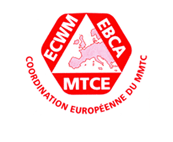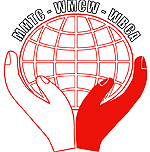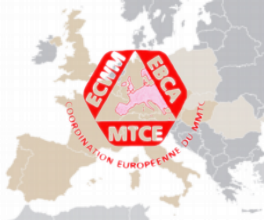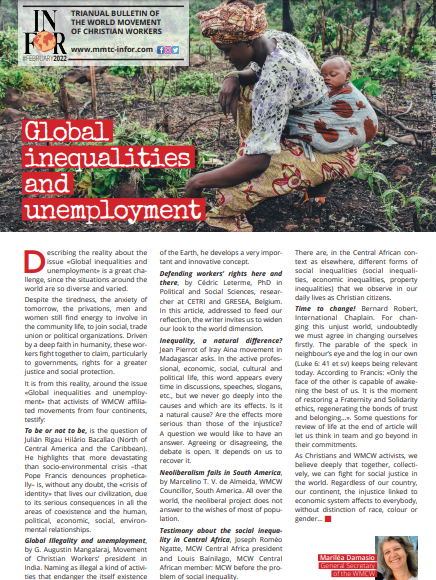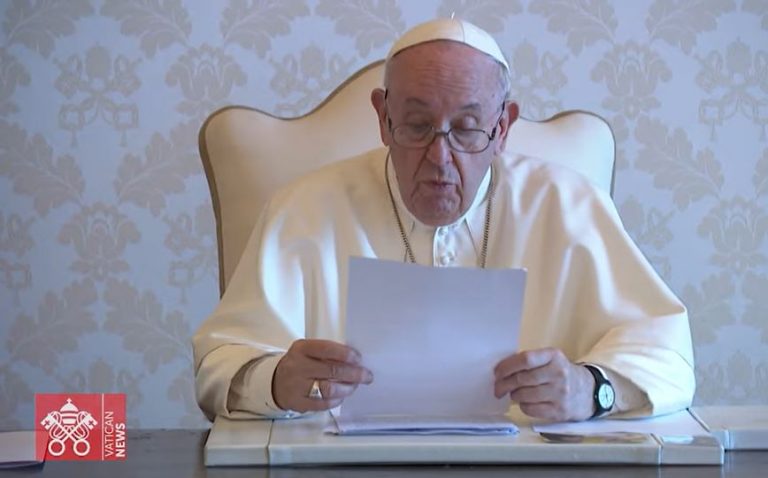
I thank the Director-General, Mr Guy Ryder, who so graciously invited me to present this message to the World of Work Summit. This Conference has been convened at a crucial moment in social and economic history, which presents serious and far-reaching challenges to the entire world. In recent months, the International Labour Organization, through its periodic reports, has done a commendable job of dedicating particular attention to our most vulnerable brothers and sisters.
During this persistent crisis, we should continue to exercise “special care” for the common good. Many of the possible and expected upheavals have not yet manifested themselves; therefore, careful decisions will be required. The decrease in working hours in recent years has resulted in both job losses and a reduction in the working day of those who have kept their jobs. Many public services, as well as many businesses, have faced tremendous difficulties, some running the risk of total or partial bankruptcy. Throughout the world in 2020 we saw an unprecedented loss of employment.
In our haste to return to greater economic activity, at the end of the Covid-19 threat, let us avoid the past fixations on profit, isolation and nationalism, blind consumerism and denial of the clear evidence that signals discrimination against our “throwaway” brothers and sisters in our society. On the contrary, let us look for solutions that will help us build a new future of work based on decent and dignified working conditions, that originate in collective negotiation, and that promote the common good, a phrase that will make work an essential component of our care for society and Creation. In this sense, work is truly and essentially human. That is what it is about, being human.
Recalling the fundamental role that this Organization and this Conference play as privileged arenas for constructive dialogue, we are called upon to prioritize our response to workers who find themselves on the margins of the labour market and who are still affected by the Covid-19 pandemic; low-skilled workers, day labourers, those who work in the informal sector, migrant and refugee workers, those who perform what are commonly referred to as “3Ds occupations”: dangerous, dirty and degrading, and the list could go on.
Many migrants and vulnerable workers, together with their families, usually remain excluded from access to national programmes for health promotion, disease prevention, treatment and care, as well as plans for financial protection and psychosocial services. This is one of the many cases of this philosophy of rejection that we have become accustomed to imposing in our societies. This exclusion complicates early detection, testing, diagnosis, contact tracing and seeking medical assistance for Covid-19 for refugees and migrants, and thus increases the risk of outbreaks in those populations. Such outbreaks may not be controlled or may even be knowingly concealed, which poses an additional threat to public health. [1]
The lack of social protection measures in the face of the impact of Covid-19 has resulted in increased poverty, unemployment, underemployment, an increase of informal work, a delay in the inclusion of young people in the labour market, which is very serious, an increase in child labour, which is even more serious, vulnerability to human trafficking, food insecurity and increased exposure to infection among populations such as the sick and the elderly. In this regard, I am grateful for this opportunity to set out some key concerns and observations.
Firstly, it is the fundamental mission of the Church to appeal to everyone to work together, with governments, multilateral organizations and civil society, to serve and care for the common good and to ensure everyone’s participation in this task. No one should be left aside in a dialogue for the common good, the goal of which is, above all, to build and strengthen peace and trust among all. The most vulnerable — young people, migrants, indigenous communities, the poor — cannot be left aside in a dialogue that ought to also bring together governments, business people and workers. It is also essential that all confessions and religious communities work hard together. The Church has a long experience of participating in these dialogues through her local communities, popular movements and organizations, and she offers herself to the world as a builder of bridges to help create the conditions for such a dialogue or, where opportune, to help facilitate it. These dialogues for the common good are essential for achieving a solidarity-based and sustainable future for our common home, and should be held at community, national and international levels. And one of the hallmarks of true dialogue is that those in dialogue are at the same level of rights and obligations; and not that one who has fewer rights or more rights dialogues with one who does not have them. The same level of rights and obligations thus guarantees a serious dialogue.
Secondly, it is also essential to the mission of the Church to ensure that all obtain the protection they need according to their vulnerability: illness, age, disability, displacement, marginalization or dependency. Social protection systems, which in turn are facing major risks, must be supported and expanded to ensure access to health services, food and basic human needs. In times of emergency, such as the Covid-19 pandemic, special assistance measures are needed. Particular attention to the integral and effective provision of assistance through public services is likewise important. Social protection systems have been called upon to meet many of the challenges of the crisis, and at the same time their weak points have become more evident. Lastly, protection of workers and of the most vulnerable must be ensured through the respect of their fundamental rights, including the right to unionize. That is, joining a union is a right. The Covid-19 crisis has already affected the most vulnerable, and they should not be negatively affected by measures to accelerate a recovery that is focused solely on economic indicators. Or rather, here we also need a reform of the economic system, a deep reform of the economy. The way of advancing the economy must be different, it must also change.
In this moment of reflection, in which we seek to shape our future action and shape a post-Covid-19 international agenda, we should pay particular attention to the real danger of forgetting those who have been left behind. They run the risk of being attacked by a virus even worse than Covid-19: that of selfish indifference. In other words, a society cannot progress by discarding. This virus spreads by thinking that life is better if it is better for me, and that everything will be fine if it is fine for me, and so we begin and end by selecting one person in place of another, discarding the poor, sacrificing those who have been left behind on the so-called “altar of progress”. It is a truly elitist dynamic, of building up new elites at the cost of discarding many people and many peoples.
Looking to the future, it is fundamental that the Church, and therefore the action of the Holy See with the International La-bour Organization, support measures that correct unjust or incorrect situations that condition labour relations, completely subjugating them to the idea of “exclusion”, or violating the fundamental rights of workers. A threat is posed by theories that consider profit and consumption as independent elements or as autonomous variables of economic life, excluding workers and determining their unbalanced standard of living: “Today everything comes under the laws of competition and the survival of the fittest, where the powerful feed upon the powerless. As a consequence, masses of people find themselves excluded and marginalized: without work, without possibilities, without any means of escape” (Evangelii Gaudium , 53).
The current pandemic has reminded us that there are no differences or boundaries between those who suffer. We are all fragile and, at the same time, all of great value. Let us hope what is happening around us will shake us to our core. The time has come to eliminate inequalities, to cure the injustice that is undermining the health of the entire human family. Faced with the Agenda of the International Labour Organization, we must continue as we did in 1931, when Pope Pius XI, after the Wall Street crisis and in the midst of the “Great Depression”, denounced the asymmetry between workers and businesses as a flagrant injustice that gave carte blanche and means to capital. He said that: “Property, that is, ‘capital,’ has undoubtedly long been able to appropriate too much to itself. Whatever was produced, whatever returns accrued, capital claimed for itself, hardly leaving to the worker enough to restore and renew his strength” (Quadragesimo Anno , n. 55). Even in those circumstances, the Church promoted the position that the wage for work done must be intended not only to satisfy workers’ immediate and current needs, but also to open the ability of workers to safeguard their families’ future savings or investments that can ensure a margin of security for the future.
Thus, since the first session of the International Conference, the Holy See has supported a uniform regulation applicable to work in all its different aspects, as a guarantee for workers. [2] It is its conviction that work, and therefore workers, can count on guarantees, support and reinforcement if they are protected from the “game” of deregulation. Moreover, legal norms must be geared towards the growth of employment, dignified work and the rights and duties of the human person. These are all necessary means for his or her well-being, for integral human development and for the common good.
The Catholic Church and the International Labour Organization, responding to their different natures and functions, can continue to implement their respective strategies, but they can also continue to seize the opportunities that arise to collaborate in a wide variety of important actions.
In order to promote this common action it is necessary to understand work correctly. The first element of this understanding invites us to focus the necessary attention on all forms of work, including non-standard forms of employment. Work goes beyond what is traditionally known as “formal employment” and the Decent Work Agenda must include all forms of work. The lack of social protection for workers in the informal economy and for their families makes them particularly vulnerable to clashes, since they cannot rely on the protection offered by social insurance or social assistance regimes aimed at poverty. Women in the informal economy, including street vendors and domestic workers, feel the impact of Covid-19 from various standpoints, from isolation to extreme exposure to health risks. As there are no accessible day-care centres, the children of these workers are exposed to an increased health risk because their mothers must take them to the workplace or leave them at home unattended. [3] Therefore, it is particularly necessary to ensure that social assistance reaches the informal economy and pays special attention to the particular needs of women and girls.
The pandemic reminds us that many women around the world continue to yearn for freedom, justice and equality among all human beings: “Even though significant advances have been made in the recognition of women’s rights and their participation in public life, in some countries much remains to be done to promote those rights. Unacceptable customs still need to be eliminated. I think particularly of the shameful ill-treatment to which women are sometimes subjected, domestic violence and the various forms of enslavement.... I think ... of their lack of equal access to dignified work and roles of decision-making” (Amoris Laetitia , n. 54).
The second element for a correct understanding of work: if work is a relationship, then it must include the dimension of care, because no relationship can survive without care. Here we are not just referring to the work of assistance: the pandemic reminds us of its fundamental importance, which perhaps we have overlooked. Care goes further; it must be a dimension of all work. Work that does not take care, that destroys Creation, that endangers the survival of future generations, does not respect the dignity of workers and cannot be considered decent. On the contrary, work that cares, that contributes to the restoration of full human dignity, will help to ensure a sustainable future for future generations. [4] And this dimension of care involves, first and foremost, the workers. In other words, a question we can ask ourselves in our daily lives: how does a business, for example, take care of its workers?
In addition to a correct understanding of work, emerging from the current crisis in better conditions will require the development of a culture of solidarity, to combat the throwaway culture that is at the root of inequality and that afflicts the world. To achieve this goal it will be necessary to accord value to the contribution of all those cultures, such as indigenous ones, popular ones, which are often considered mar-gi-nal, but that keep alive the practice of solidarity, that “express much more than a few sporadic acts of generosity”. Every people has its own culture, and I think it is time to permanently free ourselves of the legacy of the Enlightenment, which associated the word ‘culture’ with a certain type of intellectual formation and social belonging. Every people has its own culture and we have to accept it as it is. “It means thinking and acting in terms of community. It means that the lives of all are prior to the appropriation of goods by a few. It also means combatting the structural causes of poverty, inequality, the lack of work, land and housing, the denial of social and labour rights. It means confronting the destructive effects of the empire of money.... Solidarity, understood in its most profound meaning, is a way of making history, and this is what popular movements are doing” (Fratelli Tutti , n. 116).
With these words I address you, participants in the 109th International Labour Conference, because as institutionalized actors in the world of work, you have a great opportunity to influence the processes of change already underway. Your responsibility is great, but the good you can achieve is even greater. I therefore invite you to respond to the challenge we face. Established actors can count on the legacy of their history, which continues to be a resource of fundamental importance, but in this historical phase they are called upon to remain open to the dynamism of society and to promote the emergence and inclusion of less traditional and more marginalized actors, bearers of alternative and innovative impulses.
I ask political leaders and those who work in governments to always seek inspiration in that form of love that is political charity: “it is an equally indispensable act of love to strive to organize and structure society so that one’s neighbour will not find himself in poverty. It is an act of charity to assist someone suffering, but it is also an act of charity, even if we do not know that person, to work to change the social conditions that caused his or her suffering. If someone helps an elderly person cross a river, that is a fine act of charity. The politician, on the other hand, builds a bridge, and that too is an act of charity. While one person can help another by providing something to eat, the politician creates a job for that other person, and thus practices a lofty form of charity that ennobles his or her political activity” (Fratelli Tutti , n. 186).
I remind businesspeople of their true vocation: to produce wealth in the service of all. Business activity is essentially “a noble vocation, directed to producing wealth and improving our world. God encourages us to develop the talents he gave us, and he has made our universe one of immense potential. In God’s plan, each individual is called to promote his or her own development, and this includes finding the best economic and technological means of multiplying goods and increasing wealth. Business abilities, which are a gift from God, should always be clearly directed to the development of others and to eliminating poverty, especially through the creation of diversified work opportunities. The right to private property is always accompanied by the primary and prior principle of the subordination of all private property to the universal destination of the earth’s goods, and thus the right of all to their use” (Fratelli Tutti , n. 123). Sometimes, in speaking of private property we forget that it is a secondary right, which depends on this primary right, which is the universal destination of goods.
I call on trade unionists and leaders of workers’ associations not to allow themselves to be “straitjacketed”, to focus on the real situations of the neighbourhoods and communities in which they operate, while at the same time addressing issues related to broader economic policies and “macro-relationships”. [5] Even in this historical phase, the trade union movement faces two major challenges. The first is prophecy, linked to the very nature of trade unions, to their most genuine vocation. Trade unions are an expression of the prophetic profile of society. Trade unions are born and reborn every time that, like the biblical prophets, they give voice to those who do not have one, denouncing those who would “buy the poor … for a pair of sandals” as the prophet says (cf. Amos 2:6), exposing the powerful who trample on the rights of the most vulnerable workers, defending the cause of foreigners, the least and the rejected. Clearly, when a trade union becomes corrupt, it can no longer do this, and it transforms into the status of a pseudo-employer, itself distanced from the people.
The second challenge: innovation. The prophets are sentinels who keep watch from their observation post. Trade unions must also watch over the walls of the city of work, like a guard who watches over and protects those inside the city of work, but who also watches over and protects those who are outside the walls. Trade unions do not fulfil their fundamental function of social innovation if they only protect pensioners. This must be done, but it is half of your job. Your vocation is also to protect those who do not yet have rights, those who are excluded from work and who are also excluded from rights and from democracy. [6]
Esteemed participants in the tripartite processes of the International Labour Organization and of this International Labour Conference, the Church supports you, she walks beside you. The Church makes her resources available, beginning with her spiritual resources and her Social Doctrine. The pandemic has taught us that we are all in the same boat and that only together can we emerge from the crisis.
Thank you.
______________________________________
[1] Cf. “Preparedness, prevention, and control of coronavirus disease (Covid-19) for refugees and migrants in non-camp settings”, Interim Guidance, World Health Organization, 17 April 2020, https://www.who.int/publications-detail/preparedness-revention-and-control-of-coronavirus disease-(covid-19)-for-refugees-and-migrants-in-non-camp-settings.
[2] Cf. Letter “Noi rendiamo grazie ” from Pope Leo XIII to His Majesty Wilhelm II, of 14 March 1890.
[3] Cf. https://www.wiego.org/sites/default/files/resources/file/Impact_on_livelihoods_Covid-19_final_EN_1. pdf.
[4] Cf. Care is work, work is care, Report of “The future of work, labour after Laudato Si’ project”, https://futureofwork-labourafterlaudatosi.net/.
[5] Cf. Pope Francis, Address to Participants in the 3rd World Meeting of Popular Movements , 5 November 2016.
[6] Cf. Pope Francis, Address to Delegates from the Italian Confederation of Workers’ Unions (cisl), 28 June 2017.
Copyright © Dicastero per la Comunicazione - Libreria Editrice Vaticana
